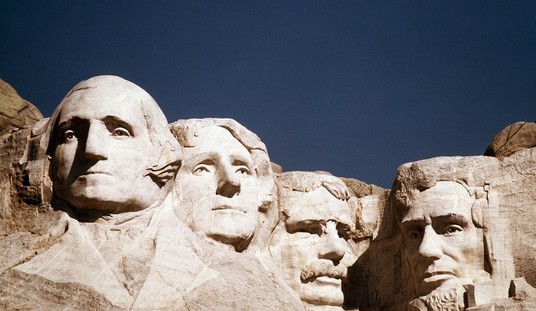(The opinions expressed by contributors are their own and do not necessarily represent the views of RedState.com.)
Some RedState colleagues and I are attending the Turning Point USA AmericaFest Conference in Phoenix, Arizona this weekend, and I was excited to see Tucker Carlson speak Saturday night at the desert city’s Convention Center. I did not get what I expected.
I’ve found Tucker to be an interesting media presence since he first started appearing on the scene in his then-signature bow tie on (if you can believe it) CNN and MSNBC in the 1990s.
But it was during the first year of the COVID pandemic that I began to really appreciate his Fox News show. As I watched my business crumble, my kids sink into depression, and my home city of Los Angeles descend into a dystopian nightmare, I found his nightly monologue to be like a voice of sanity in the wilderness. (There were other such voices—RedState being one of them.)
“Oh thank God,” I would think, “I’m not actually going insane. Other people can see what’s happening, too.”
So when I walked into the packed auditorium, I expected to hear in person his scathing criticisms of border policy, his epic dissections of the lunatic democrats running the country, and his incisive takedowns of Joe Biden.
What Tucker delivered instead was a moving, introspective, and uplifting speech about spirituality, faith, and something even simpler—cheerfulness.
He was at times somber, giddy, hopeful, concerned, even silly.
Liberals love to portray him as a troglodyte, a right-wing maniac with little depth. They would be surprised, however, at his intellectual curiosity if they ever actually listened to what he said instead of simply trying to paint him as a bogeyman.
Speaking without notes, he talked about the setbacks he’d experienced in life (like getting fired), how we need to learn that we simply cannot predict the future, and how logic dictates that there must be something bigger than ourselves:
I’m making a point about the existence of something more powerful than us. And that shouldn’t be a point that anyone would have to make because it’s just so obvious—you’re born knowing that every person has, inborn, literally at birth, a sense of justice, of right and wrong; a sense that betraying other people, lying to them, stealing from them, or hurting them is wrong…
So what does that tell you? It tells you there’s something bigger than us, and that’s never something that most people in most periods in history—in fact in any period in history—have ever needed to learn. Because they knew it, it was assumed.
He went on to explain that virtually every other country on record has taken that for granted; this is the first era where the elites are the gods, and the existence of a higher power than ourselves is denied (emphasis mine):
Why is that significant? Well, here’s why: because in place of that has been the option, which is leaders who believe they are God. And the problem with believing you’re God, is—you’re not. You’re not. And you can’t be.
It’s just not true.
And the minute you pretend otherwise, you lead us into disaster. And that is true at the national level. Having people who don’t believe in God, in other words, who don’t acknowledge that authority among themselves isn’t just, like, bad—it’s a recipe for total destruction. [Applause.]
How does this explain what we are seeing now—the seemingly purposeful decay of our cities, the willingness to allow crime to fester a little more each day, and the pushing of gender ideology on kids not even old enough to understand what sex is? Tucker has thoughts:
… leaders who don’t believe in God think they are God. And the last person you ever want is in charge is someone who is demonstrably insane. And anyone who thinks he’s God is by definition insane…
And that fact I would say, explains the majority of what we’re seeing now. The things that confused me as a middle-aged man was looking out on a country I don’t recognize, and more specifically of politics I don’t understand.
He points out that while once (some) people tolerated abortion as a necessary evil, now folks like Treasury Secretary Janet Yellen are now openly advocating it as a good thing, while others are happily pushing life-changing sexual surgeries on minors.
Despite all the difficulties facing our country, and the world, Carlson is still cheerful. In what to me was the most interesting segment, he explained why:
So why am I still in a good mood? I’ll start with this… I’m still in a good mood for two reasons. One, I think it’s my moral duty to give [sic] an obligation to be cheerful. I think it’s a small thing. Yeah, I mean…
But I think it’s your obligation. Like you’re not here that long. And moping….sometimes terrible things happen, a loved one dies, you get fired—in my case several times. You have an absolute right to wallow in it for a bit, but just for a bit. It’s immoral to lie in your own emotional filth and roll around in it… it’s immoral.
You have no right to do that.
I’m someone who’s on occasion felt sorry for himself, and as a person who loves this country, I’ve frankly been disheartened by first Joe Biden’s presidential victory, then his efforts to destroy America as we know it, and then more recently the deflating midterm elections. But Carlson is right—we were not put on this earth to mope and wallow around in our darker emotions. Me—or you—wallowing isn’t going to make anything better; it will just make things that much worse.
He closed out the talk with his theory, which he tells his kids, namely that the number one quality you should look for in a spouse is something simple: cheerfulness. At first, that might sound trite and simplistic, even a little foolish. Carlson himself acknowledged with his trademark high-pitched laugh that he might sound like a late-night TV self-help guru. But here’s the thing: he’s absolutely right. I by the grace of God married someone who’s uplifting and full of happiness—even when things aren’t going her way—and it’s made all the difference to me. I can’t say I’ve been her equal in that department, but I’ve gotten better; and honey, if you’re reading this, I resolve to try harder to be grateful. (And yeah… I know I was supposed to take out the trash, but I was running late. I also resolve to take it out when I get back.)
I can’t sum up the entire speech in one article, but I found Carlson to be surprisingly philosophical and fascinating. I’ve seen glimpses of that side of him on his television show, but never to this extent. I didn’t see what I came to see, but I’m grateful for what he brought, and he gave me plenty of food for thought.
And if you’re not getting it yet, play this, then go forth and be a happy conservative warrior.














